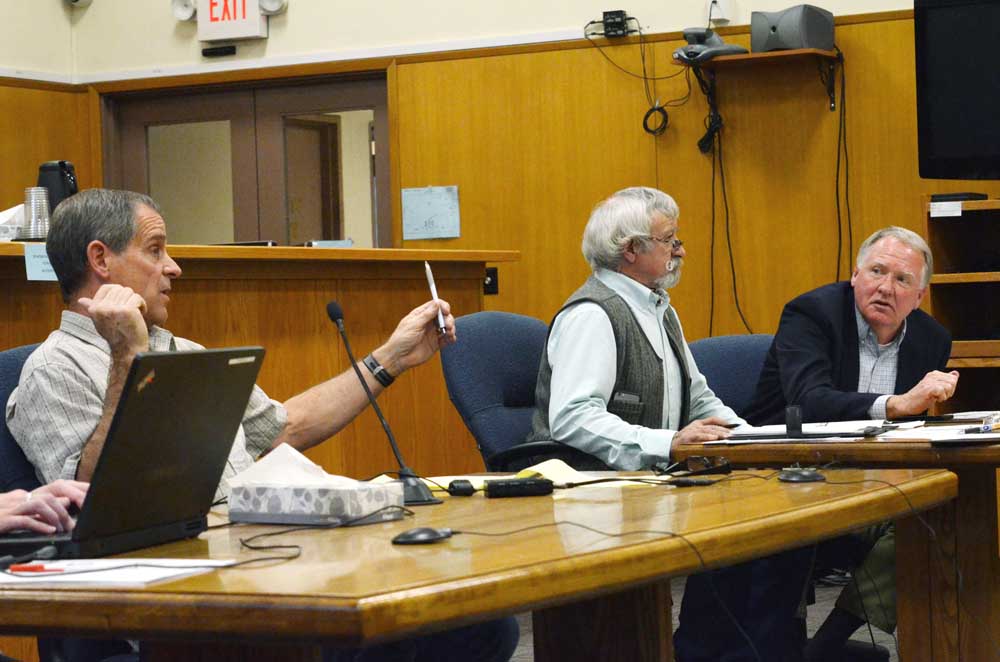Challenge to county pot ban ordinance withdrawn
Published 2:38 pm Friday, January 8, 2016

- From left, Grant County Judge Scott Myers, Commissioner Boyd Britton and Commissioner Chris Labhart listen to public testimony about an ordinance banning commercial marijuana operations Dec. 16. Myers and Britton signed the ban into law after the hearing.
A legal challenge to the Grant County ordinance banning commercial marijuana operations has been withdrawn.
Several county residents had requested a court order invalidating the ordinance, claiming procedural errors in its adoption, but a hearing scheduled for Jan. 6 was canceled after attorneys for both sides discussed the matter.
Attorney Robert Raschio filed a complaint for declaratory and injunctive relief against the county Dec. 28 on behalf of his clients, Jerry Russell, Eva Harris and Paul and Loreen Cooper. Russell and the Coopers sought to legally grow marijuana on their properties in northwestern Grant County, according to the complaint, and Harris is a medical marijuana patient who relies on others for transportation to the nearest dispensary in Deschutes County.
Raschio said County Judge Scott Myers indicated he was willing to hold a hearing on referring the ordinance to county voters, so his clients dropped the complaint.
“We need a hearing on the referral as quickly as possible,” Raschio said. “With these assurances, my clients felt it was in the best interest of everyone that the injunction request be dismissed for now as to not cost the county or my clients any more resources. My clients want to bring resources into this county not take it away.”
County Judge Scott Myers said he was pleased the issue was resolved without further litigation.
“It was going to be expensive for both sides,” he said. “I think it’s best for all involved.”
Myers said county attorney Ron Yockim is looking into the possibility of the county referring the ordinance to voters, which the county commissioners will consider. Yockim had prepared a 44-page response to the complaint submitted by Raschio, Myers said, and the agreement for the complaint to be withdrawn also included an assurance that the county would not seek attorney fees from Raschio’s clients.
Raschio said he believed the county would now refer the matter to the voters, a majority of whom he believes will vote to allow “making money and bringing jobs here” through marijuana businesses, despite the fact 65 percent of the county voted against Measure 91 in 2014, which legalized recreational marijuana.
“We believe that the county court will do what the people of Grant County expect and give them a voice in this process through a vote,” he said. “… My clients and I are confident that the people of Grant County, if given a chance to vote on whether they want jobs and tax revenues from a legal activity in (the) State of Oregon or no jobs and no tax revenues, they will (choose) to reject the Measure 91 opt-out passed in Grant County Ordinance 15-01 and allow businessmen in Grant County access to the free market to bring jobs to our county suffering nearly 10 percent unemployment.”
Although bills enacted by the Oregon Legislature in 2015 only allow taxes to be collected from retail marijuana sales, county residents who argued against the ban on marijuana growers and expressed interest in growing — including Russell and Paul Cooper — volunteered to pay a 3-percent fee of their growing revenues to the county.
The complaint that was withdrawn alleged the Grant County Court improperly passed the ordinance as an emergency, effective immediately, without a unanimous vote. The complaint further alleged that, although the commissioners discussed the ordinance at four consecutive weekly meetings in December, Myers’ language stating the hearing was continued from one meeting to the next legally indicated the four dates were a single meeting.






